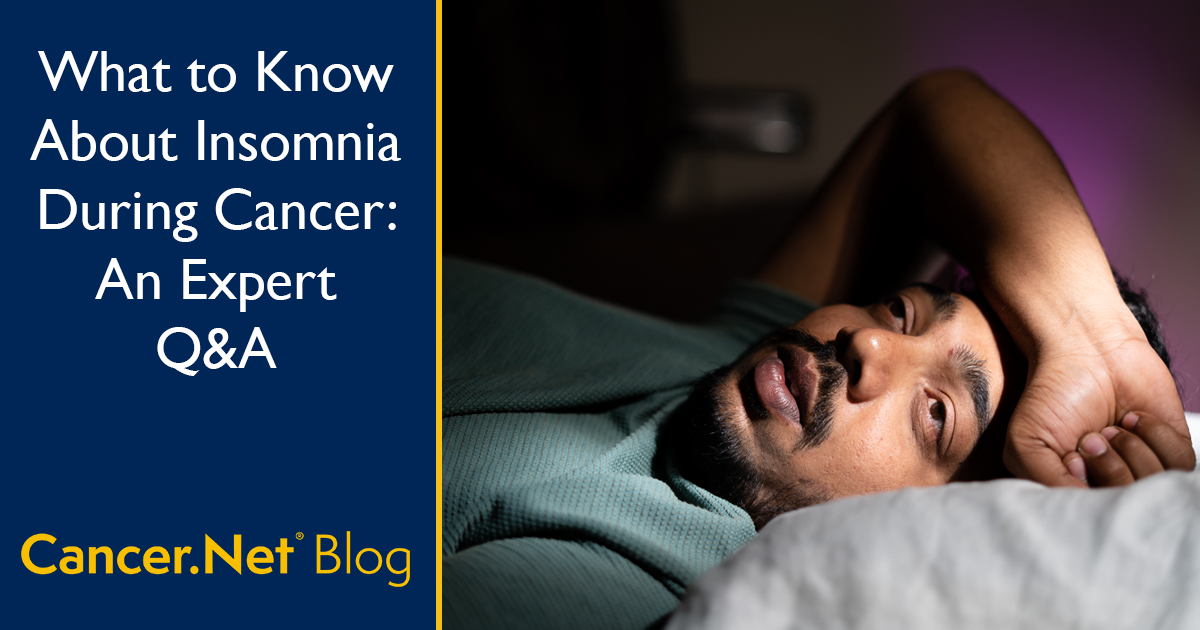
Elizabeth Kacel, PhD, is a clinical health psychologist who specializes in cancer. She is currently employed at the Kellogg Cancer Center in Chicago, Illinois, which is part of NorthShore-Edward Elmhurst Health. She has over 10 years of experience in the field of psycho-oncology, including patient care, research, and education. She uses scientifically supported psychotherapy approaches to empower patients to cope effectively and live meaningfully across all phases of the cancer care continuum.
Cancer-related insomnia is when a person experiences significant trouble with sleep following a cancer diagnosis. Sleep problems related to insomnia can include trouble falling asleep, difficulty staying asleep, or waking up too early. Some people experience insomnia prior to having cancer and find that their sleep gets worse after a cancer diagnosis. Others may have slept well before cancer but have trouble sleeping once they begin cancer treatment.
While there are specific criteria a person needs to meet for a formal diagnosis of insomnia, even if someone doesn’t quite meet those criteria, sleep troubles can still be very frustrating and challenging to navigate during cancer. Here, learn more about what you can do to help manage cancer-related insomnia, including steps you can take toward getting a better night’s sleep.
What can cause cancer-related insomnia?
There are several factors that can contribute to insomnia in people with cancer. Factors that can lead to insomnia include:
-
Difficult emotions after receiving a cancer diagnosis, like worry or sadness
-
Chemotherapy and other medications used in cancer treatment, which can cause an interruption in your body’s natural sleep rhythms
-
Physical symptoms, like pain, nausea, hot flashes, or needing to use the bathroom, which can cause frequent sleep interruptions
-
Substance use, like alcohol or nicotine, which can make it harder to fall asleep or stay asleep due to the chemical effects of the substance on the brain
-
Social factors, like living in a noisy neighborhood or sharing your bed with someone who snores
All of these factors can interact with each other as well as the other stresses of having cancer, which can lead to cancer-related insomnia.
How can cancer-related insomnia interfere with a person’s daily life?
Experiencing insomnia during cancer can lead to feeling unwell and unrested during the daytime. When you might already be feeling sick or tired from the effects of cancer treatment, this kind of fatigue can make it difficult to maintain your normal schedule. Daytime sleepiness can also make it challenging to engage in physical activity and other healthy lifestyle habits, which are an important part of cancer care and survivorship.
Additionally, poor sleep can make some side effects of cancer treatment, like pain or chemobrain, worse, which can lead to trouble concentrating or focusing at work or at home. This can lead to mistakes or accidents.
What are some of the emotional impacts cancer-related insomnia can have on a person?
Many people with cancer who experience poor sleep begin to feel depressed, irritable, or anxious. They may also feel low in motivation from the fatigue, which can be frustrating and make it harder to participate in the activities they used to enjoy most, especially those activities that would otherwise help distract them from worrying about cancer.
Some people also worry that not sleeping well will negatively impact the success of their cancer treatment or survival. However, the more someone worries about getting a good night’s sleep, the harder it actually is to fall asleep and stay asleep through the night. This is a difficult cycle, and some people may need help from their health care team to break free from it.
How can someone cope with the effects of cancer-related insomnia?
Sleep troubles are very common among people with cancer, so you are not alone if you are tossing and turning at night and wondering what to do. One of the most important things you can do to improve your sleep is to work on consistency. Try to go to bed and get out of bed around the same time every day—yes, even on weekends! Make sure your bedroom is cool, clean, calming, and quiet as much as possible. Also, take time to create a “wind down” routine for 30 to 60 minutes before bedtime so that your mind and body can get ready for a good night’s sleep. As hard as it may feel, try to avoid using electronic devices in bed or engaging in other activities that may keep your mind active. Relaxation training, also known as deep breathing or meditation, can also help you transition from a busy day to a restful bedtime and can quiet worries about cancer or other stressors.
There are a number of excellent resources available online that may also be able help you navigate the effects of cancer-related insomnia. Try checking out the websites for the American Academy of Sleep Medicine or the Society of Behavioral Sleep Medicine for tips on how to get better sleep.
How can the health care team help with managing cancer-related insomnia?
Sleep difficulties right after a cancer diagnosis can be normal due to the shock of the diagnosis. For some people, this will get better over time. However, if you are having trouble with sleep that lasts for a few weeks to a few months, it is important to let your health care team know so they can rule out medical sleep conditions, like sleep apnea, and provide guidance on potential treatment options.
In the short term, sleep medications can be very effective at managing cancer-related insomnia, and psychotherapy, a type of counseling, may help with overall distress related to your diagnosis. For longer-term trouble with sleep, psychotherapy is an excellent option. Cognitive Behavioral Therapy for Insomnia (CBTi) is a scientifically supported set of coping tools and strategies that has helped many people overcome insomnia. Your health care team may be able to connect you with mental health professionals in your community who are trained to deliver this type of treatment.
Remember, it is important to practice self-compassion while going through cancer treatment. Remind yourself that any one bad night of sleep will not be harmful to you and will often make you tired enough to improve your sleep the next night.
The author has no relevant relationships to disclose.









